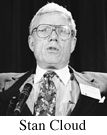Summer 1996
Hot off the Primaries: Citizens Election Project Case Studies
Six different media partnerships in four states experimented with new ways to focus on citizens’ issues during the presidential primaries and to reframe traditional political coverage so that it was driven less by political insiders.
“All shared a common assumption,” said Stanley Cloud, who directed the project, “that something was radically wrong with political journalism in America and that if journalists themselves didn’t do something to correct the problem, they might awake one morning to discover that their fellow citizens were no longer paying any attention to them at all.”

The 38-page Citizens Election Project Case Studies booklet takes you behind the scenes of these efforts in Iowa, New Hampshire, Florida and California — plus a ground-breaking on-line initiative in San Francisco and a poll watch experiment — to explore their successes and failures.
“In general, the Citizens Election Project was a major success when it came to gauging the views of the voters and helping them (as opposed to the politicians and the media) set the agenda for the campaign,” Cloud said in the introduction.
“Failure occurred in some areas when the partnerships were forced to rely on the candidates’ cooperation. As you will read here, a few town meetings either had to be cancelled or scaled back when the front-running candidates decided, for reasons best known to themselves, to boycott them. The events were citizen-driven, completely non-partisan and unscripted — and it appears to have been precisely those elements that scared away the front-runners.
“In this era, when candidates believe that the ticket to victory is to do and say as little as possible, it may be naive to assume that they will cooperate simply to help raise the level of political discourse.”
The Case Studies book was released at the Batten Symposium in May, during a panel on covering the 1996 elections “From Citizens Up.”
“What I have learned from working with these partnerships is that the voters feel that the press not only doesn’t know what’s on their minds, but doesn’t care. I think that that’s the most important bridge we can build,” Cloud told the gathering.
“The time has probably come when we need to go beyond town meetings. Not to eliminate them, but not to make them the be-all and end-all of our efforts. To try somehow to incorporate into our newsrooms the idea that civic political journalism is something that shouldn’t be just compartmentalized and reserved for special events, but should become part of the very warp and woof of the culture of our newsrooms.
“When we do that, I think then we can drop the civic part and just call it journalism again.”
To get a copy, call the Pew Center, 202-331-3200.
Also Available
Civic Journalism: Six Case Studies.
This joint report by the Pew Center and the Poynter Institute for Media Studies features three community initiatives: “Taking Back our Neighborhoods/ Carolina Crime Solutions” in Charlotte, N.C.; “We the People, Wisconsin” in Madison; and “The Public Agenda” in Tallahassee, Fla. It also examines three 1994 election projects: “The People’s Voice” in Boston, the “Voice of the Voter” in San Francisco, and “Front Porch Forum” in Seattle. Call the Pew Center, 202-331-3200, to order a copy.
“Civic Journalism” Video.
This 33-minute production, narrated by syndicated columnist and journalism professor Hodding Carter III, outlines the philosophy and some of the techniques of civic journalism. It comes with a study guide. To order, call 1-800-345-9556. The cost is $11.95 each for dubbing, packaging and postage. Master or Visa cards are accepted.
